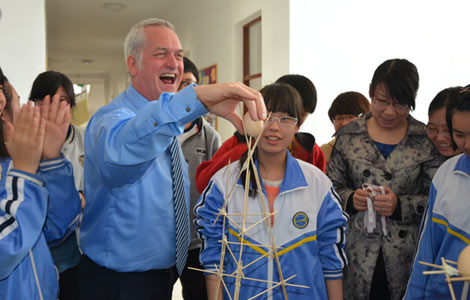Importance of Mao's diplomacy
Updated: 2013-12-23 07:37
By Gong Li (China Daily)
|
||||||||
China's victory in the new-democratic revolution in 1949 fulfilled Chinese people's long-cherished dream of national liberation. To safeguard the hard-won freedom, Chairman Mao set the basic premises of China's diplomacy: be independent, defend national sovereignty and territorial integrity, and establish and develop diplomatic relations with other countries on the basis of equality and mutual benefit. These basic principles guided New China's independent foreign policy of peace and mutually respectful relations with other countries.
At a time when New China faced the arduous task of national reconstruction, Mao made maintenance of world peace as the main objective of the nation's foreign policy. He advocated that all countries, big or small, strong or weak, rich or poor, are equal and should respect each other, and oppose hegemonism and power politics.
Besides, he called for developing friendly relations and to cooperate with all countries on the basis of the Five Principles of Peaceful Coexistence: mutual respect for sovereignty and territorial integrity; mutual non-aggression; non-interference in each other's internal affairs; equality and mutual benefit; and peaceful coexistence. That China will never seek hegemony is a concrete manifestation of New China's peaceful diplomacy and a solemn commitment of the Chinese people to the world.
According to Mao, the Five Principles of Peaceful Coexistence are applicable not only to relations between countries with different social systems, but to all inter-state relations. This principle provided the basis of the establishment of a new type of relationship between major countries.
Mao paid special attention to the countries in Asia, Africa and Latin America that gained independence from colonial rule after World War II, and made it China's diplomatic goal to strengthen relations with them. He supported the peoples of Asia, Africa and Latin America in their righteous struggles to safeguard their independence and sovereignty, emphasizing that they should help each other.
Under the strategic guidance of Mao, China adhered to (and is still following) an independent foreign policy in order to maintain world peace. Only after an arduous struggle could China gain a foothold in the international community. But by 1976, 110 countries had established diplomatic relations with China, with extensive political, economic, cultural and military exchanges. These achievements became a cornerstone of socialist modernization of China through reform and opening-up.
Most Viewed
Editor's Picks

|

|

|

|

|

|
Today's Top News
Committee of 100 seeks to tackle 'sensitive' images about China
IPR courts 'would be helpful'
GM corn rejection no to hurt market
Liaoning's combat capability tested
Sotheby's denies $8m work is fake
Castro urges US to respect differences with Cuba
Student wounded in school shooting dies
US aircraft hit by gunfire in S. Sudan
US Weekly

|

|














